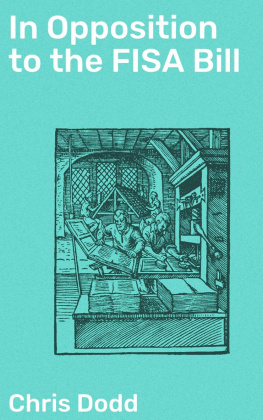Mr. President: I riseonce againto voice my strong opposition to the misguided FISA legislation before us today. I have strong reservations about the so-called improvements made to Title I. But more than that, this legislation includes provisions which would grant retroactive immunity to telecommunications companies that apparently have violated the privacy and the trust of millions of Americans by participating in the presidents warrantless wiretapping program. If we pass this legislation, the Senate will ratify a domestic spying regime that has already concentrated far too much unaccountable power in the presidents hands and will place the telecommunications companies above the law.
I am here today to implore my colleagues to vote against cloture in the morning.
And let me make clear, at the outset of this debate, that this is not about domestic surveillance itself. We all recognize the importance of domestic surveillancein an age of unprecedented threats. This is about illegal, unwarranted, unchecked domestic surveillance.
And that differencethe difference between surveillance that is lawful, warranted and that which is notis everything.
Mr. President, I had hoped I would not have to return to this floor again under these circumstanceshoped that in these negotiations we would have been able to turn aside retroactive immunity on the grounds that it is bad policy and sets a terrible precedent.
As all of my colleagues know, I have long fought against retroactive immunity, because I believe, quite simply, it is an abandonment of the rule of law. Ive fought this with everything I had in meand I havent waged this fight alone.
In December, I opposed retroactive immunity on the Senate floor. I spent ten hours on this floor then. In January and February, I came to the floor time and time again to discuss the dangers of granting retroactive immunity. Along with my colleague and friend Russ Feingold, who has shown remarkable leadership on this issue, I offered an amendment that would have stripped retroactive immunity from the Senate bill. Unfortunately, our amendment failed and to my extreme disappointment, the Senate adopted the underlying bill.
Since passage of the Senate bill, there has been extensive negotiations on how to move forward. Today, we are being asked to pass the so-called compromise that was reached by some of our colleagues and approved by the House of Representatives.
I am here today to say that I will not and cannot support this legislation. It goes against everything I have stood foreverything this body ought to stand for.
There is no question some improvements have been made over the previous versions of this bill. Title I, which regulates the ability of the government to conduct electronic surveillance, has indeed been improved. Albeit modestly. In fact, it is my hope that a new Congress and a new President will work together to fix the problems with Title I should the Senate adopt this new legislation.
But in no way is this compromise acceptable, Mr. President. This legislation before us purports to give the courts more of a role in determining the legality of the telecommunications companies actions. But in my view the Title II provisions do little more than ensure without a doubt that the telecommunications companies will be granted retroactive immunity.
Allow me to quote the Senate Intelligence Committee report on the matter. It reads:
Beginning soon after September 11, 2001, the Executive branch provided written requests or directives to U.S. electronic communication service providers to obtain their assistance with communications intelligence activities that had been authorized by the President.
The letters were provided to electronic communication service providers at regular intervals. All of the letters stated that the activities had been authorized by the President. All of the letters also stated that the activities had been determined to be lawful by the Attorney General, except for one letter that covered a period of less than sixty days. That letter, which like all the others stated that the activities had been authorized by the President, stated that the activities had been determined to be lawful by the Counsel to the President.
Under the legislation before us, the district court would simply decide whether or not the telecommunication companies received documentation stating that the President authorized the program and that there had been some sort of determination that it was legal.
But, as the Intelligence Committee has already made clear, we already KNOW that this happened.
We already KNOW that the companies received some form of documentation, with some sort of legal determination.
But thats not the question. The question is not whether these companies received a document from the White House. The question is, were their actions legal? Its rather straightforwardsurprisingly uncomplicated.
Either the companies were presented with a warrant, or they werent. Either the companies and the President acted outside of the rule of law, or they followed it. Either the underlying program was legal or it wasnt.
Because of this legislation, none of the questions will be answered, Mr. President. Because of this so-called compromise, the judges hands will be tied, and the outcome of these cases will be predetermined. Because of this compromise, retroactive immunity will be granted and that, as they say, will be that. Case closed.
No court will rule on the legality of the telecommunications companies activities in participating in the presidents warrantless wiretapping program.
None of our fellow Americans will have their day in court.
What they will have is a government that has sanctioned lawlessness.
Well, I refuse to accept that, Mr. President. I refuse to accept the argument that because this situation is just too delicate, too complicated, that this body is simply going to go ahead and sanction lawlessness.
We are better than that.
And if I have needed any reminder of that fact, simply look to all those who have joined this fightmy colleagues and the many, many Americans who have given me strength for this fight. Strength that comes from the passion and eloquence of citizens who dont have to be involved, but choose to be nonetheless.
They see what I see in this debatethat by short-circuiting the judicial process we are sending a dangerous signal to future generations. They see us establishing a precedent that Congress canand willprovide immunity to potential law breakers, if they are important enough.
Mr. President, some may be askingwhy is retroactive immunity so dangerous?
What is this issue? Why should I care?
Allow me to explain by providing a bit of context. I want to remind my colleagues of what I said about this bill months ago, because the argument against providing retroactive immunity remains unchanged.
Mr. President, unwarranted domestic spying didnt happen in a panic or short-term emergency, not for a week, or a month, or even a year. If it had, I might not be here today.
But that isnt the case. What we now know is that spying by this Administration went on, relentlessly, for more than five years.














